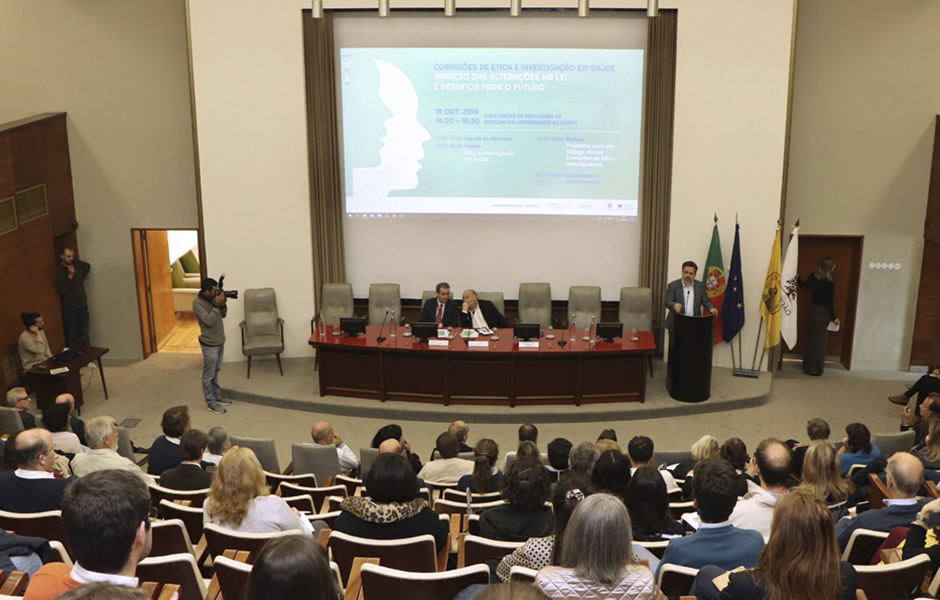The Aula Magna of the Faculty of Medicine of the University of Porto (FMUP) was filled with researchers, health professionals, students and teachers who wanted to participate in the event “Committees of Ethics and Health Research – impact of changes in the law and challenges for health future”, which took place on October 18, with the support of CINTESIS – Center for Health Technology and Services Research and the University Hospital Center of São João (CHUSJ).
João Fonseca, CINTESIS researcher and director of the Department of Community Medicine, Health Information and Decision (MEDICDS) at FMUP, was responsible for the initiative, which aimed to “build bridges” and promote dialogue between researchers and Ethics Committees ( EC).
The director of FMUP, Altamiro da Costa Pereira, and the chairman of the Board of Directors of the CHUSJ, Fernando Araújo, attended the opening ceremony. They both stressed the importance of health research for biomedical knowledge and better care, in full compliance with ethical principles. They also highlighted the existence of a common Ethics Committee as a good example of the synergies and joint work of the two institutions.
“Together we are stronger than the sum of the parts,” said Fernando Araújo, who also spoke during the first panel. Speaking about the new Law of Ethics Committees (DL 80/2018, which establishes the principles and rules applicable to ethics committees of health institutions, higher education institutions and biomedical research centers that carry out clinical research), the official considered that it must be seen as “an instrument and not an end in itself” and that its success depends on how it is applied.
In a discussion moderated by Alberto Hespanhol (FMUP / EC chairman of the Northern Regional Health Administration), the stakeholders assessed the national panorama of the EC and discussed the main difficulties, notably the lack of training, delays in advice, excessive bureaucracy and duplication of tasks.
Paulo Santos, CINTESIS researcher, FMUP professor and member of the Health Ethics Committee of the Northern Regional Health Administration (ARS), recalled that “ethics is not an exact science” and assured that researchers sometimes feel treated as “irresponsible, dangerous and even incompetent” by Health Ethics Committees, which may be risking the “enforcement of paternalism” with patients.
Miguel Ricou, CINTESIS researcher, FMUP professor and chairman of the Ethics Committee of the Order of Portuguese Psychologists, confirmed that some colleagues feel “offended with certain observations” made by ECs, lamented the “mania for distrust” and the “violence” of duplication of work that is required.
Regarding the assessment of methodological aspects by the EC, Luís Azevedo (CINTESIS / FMUP) recalled that this is a requirement of the law itself, but agreed that procedures should be made simpler and faster, meeting deadlines and improving the training of EC members in this area.
Ana Margarida Ferreira (CINTESIS / FMUP) and Rui Guimarães (CHUSH / Access to Information Officer at FMUP) emphasized the need to protect patient data, either by complying with the General Data Protection Regulation (RGPD), or by other means, such as binding researchers to certain obligations or setting up working groups to collect and process data.
The first panel was followed by a debate among researchers and HECs members at national level, moderated by the journalist Lígia Pinto. António Faria Vaz (RedEtica – National Association of Ethics Committees / INFARMED), Helder Mota Filipe (Ethics Committee for Clinical Research – CEIC in Portuguese), Laura Ribeiro (FMUP), Filipe Almeida (CHUSJ / FMUP), Francisca Saraiva (UnIC) , Pedro Pereira Rodrigues (CINTESIS / FMUP) and António Soares (CINTESIS / FMUP) discussed proposals for an effective dialogue among HECs and researchers.
Faced with complaints about difficulties and delays, Helder Filipe assured that the two institutions have “the concern of not being a limiting step”, contributing to “Portugal’s competitive capacity” in the field of clinical trials.
In the end, Rui Nunes (CINTESIS / FMUP / president of the Portuguese Association of Bioethics) launched a challenge to the Ethics Committees to invest in training and to bring these issues to society and schools, thus contributing to a “responsible citizenship” from early ages. The expert also launched the challenge of moving to the EC 3.0, making “it makes perfect sense that there is a separation among research ECs, Clinical Bioethics ECs and, why not, animal research ECs”.
Related Videos:
A opinião dos investigadores: Luís Filipe Silva (I3S/FMUP), André Moreira (ISPUP/FMUP), Júlio César Rocha (CINTESIS/NOVA Medical School), André Albergaria (I3S/FMUP), Delfim Duarte (I3S/FMUP/IPO Porto) and Armando Mansilha (UnIC/FMUP) talk about the main positive aspects and the difficulties that arise in the relationship between researchers and Ethics Committees.
Students Opinion: What skills are required to join an Ethics Committee? Would you like to have more training on the ethical and regulatory aspects of submitting requests of review? Barbara Antunes and Hugo Monteiro, postgraduate students at FMUP, give their opinion.
The opinion of the members of the Ethics Committees: How to evaluate the relationship between researchers and Ethics Committees? Natália Teles and Pedro Brito provide the view of the Ethics Committees and leave some suggestions that may facilitate this interaction.

